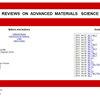超声时间对碱处理芒果籽废料填料增强 PVA 生物复合材料各种性能的影响
IF 3.6
4区 材料科学
Q2 MATERIALS SCIENCE, MULTIDISCIPLINARY
引用次数: 0
摘要
由于石油基合成材料造成的环境问题,可生物降解材料的应用越来越广泛。农业废弃物材料作为聚合物复合材料的增强材料,其成本效益和可用性使其具有更大的应用空间。这项研究工作的主要目的是利用芒果种子废料(MSW)作为增强材料,与聚乙烯醇(PVA)形成生物复合材料。生物复合材料采用溶液浇铸技术制成。研究工作的重点是不同超声处理时间(0-20 分钟,间隔 5 分钟,即 0、5、10、15 和 20 分钟)对 PVA/MSW 生物复合材料性能的影响。对制成的生物复合材料进行了拉伸试验、断口形貌、吸湿性(MA)、傅立叶变换红外光谱和热重分析。结果显示,20 分钟超声处理样品的拉伸强度最高,达到 3.95 兆帕。这一数值比未经超声处理的样品高出 49%。扫描电子显微镜分析表明,与其他样品相比,超声处理 20 分钟的样品表明 MSW 填料在 PVA 中分布良好。经超声处理的样品的热稳定性明显高于未处理的样品,而 MA 值则随着超声时间的延长而降低。从结果中可以看出,生物复合材料是包装应用中合成材料的潜在替代品。本文章由计算机程序翻译,如有差异,请以英文原文为准。
Influence of ultrasonication time on the various properties of alkaline-treated mango seed waste filler reinforced PVA biocomposite
The usage of biodegradable materials is gaining mounting applications owing to the environmental problems created by petroleum-based synthetic materials. Agro-waste materials are finding more scope as reinforcement materials in polymer composites, mainly because of their cost-effectiveness and availability. The main aim of this research work is to utilize agro-waste material in the form of mango seed waste (MSW) as a reinforcing material with polyvinyl alcohol (PVA) to form biocomposite. The biocomposites were fabricated using the solution casting technique. The research work focuses on the influence of varying ultrasonication periods (0–20 min at 5-min intervals, i.e. , 0, 5, 10, 15, and 20 min) on the properties of PVA/MSW biocomposites. The fabricated biocomposites were subjected to tensile test, fracture morphology, moisture absorption (MA), Fourier transform infrared spectroscopy, and thermogravimetric analysis. The results revealed that the material with the highest tensile strength was 3.95 MPa obtained with the 20-min ultrasonication sample. This value is 49% higher than that obtained in the sample without ultrasonication. The scanning electron microscopy analysis shows that the 20-min ultrasonication sample indicated a good distribution of MSW fillers in the PVA contrasted with the rest of the samples. The thermal stability of the samples treated with ultrasonication was found to be significantly higher than that of the untreated samples, whereas the MA value decreased with increasing ultrasonication time. It can be observed from the results that biocomposites can be a potential alternative to the synthetic materials used in packaging applications.
求助全文
通过发布文献求助,成功后即可免费获取论文全文。
去求助
来源期刊

Reviews on Advanced Materials Science
工程技术-材料科学:综合
CiteScore
5.10
自引率
11.10%
发文量
43
审稿时长
3.5 months
期刊介绍:
Reviews on Advanced Materials Science is a fully peer-reviewed, open access, electronic journal that publishes significant, original and relevant works in the area of theoretical and experimental studies of advanced materials. The journal provides the readers with free, instant, and permanent access to all content worldwide; and the authors with extensive promotion of published articles, long-time preservation, language-correction services, no space constraints and immediate publication.
Reviews on Advanced Materials Science is listed inter alia by Clarivate Analytics (formerly Thomson Reuters) - Current Contents/Physical, Chemical, and Earth Sciences (CC/PC&ES), JCR and SCIE. Our standard policy requires each paper to be reviewed by at least two Referees and the peer-review process is single-blind.
 求助内容:
求助内容: 应助结果提醒方式:
应助结果提醒方式:


